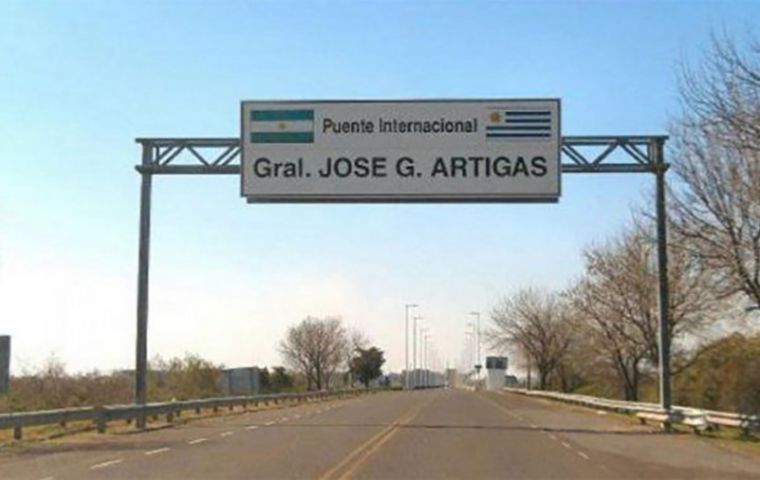MercoPress. South Atlantic News Agency
Argentina recants opening border crossings with Uruguay for now over sanitary concerns
 Uruguay's Ambassador to Buenos Aires Carlos Enciso had been told the bridges were going to be reopened Sept. 6
Uruguay's Ambassador to Buenos Aires Carlos Enciso had been told the bridges were going to be reopened Sept. 6 The Government of Argentina has finally decided not to go ahead with the reopening of the bridge crossings into Uruguay, citing COVID-19 epidemiological reasons.
Earlier last week, Uruguay's Ambassador in Buenos Aires Carlos Enciso and Argentina's National Migrations Director Florencia Carignano had announced what in the end is not happening.
With the highly devalued Argentine peso, local authorities feared an avalanche of Uruguayans would flock into the country to take advantage of the exchange rate.
Andrés Lima, mayor of the Uruguayan city of Salto, had foreseen such a problem would occur since people living in bordering areas would simply go across the bridge to do their shopping as well as to tank up their cars.
“This is a problem that has its years and its ups and downs. Sometimes prices are cheaper in Uruguay and in that case Argentines cross over. Other times, like this time, it is the other way around. This is something traditional in border regions. It also passes in the north, with Brazil. Since there is no coordinated policy between the countries, these difficulties arise,” Lima told Infobae.
Uruguayan authorities had devised a series of measures to discourage shopping tours, such as a series of discounts, including a 24% reduction in the price of fuel, which would nonetheless leave petrol on the Argentine side still cheaper.
Lima also brought up the causes of the towns of Rivera and Artigas which are divided by a street with Santa Ana and Quarai in Brazil where prices are much lower. To neutralize those differences, duty-free shops were set up in Uruguayan territory. “Here we propose something similar, with the same result,” explained Lima, who recalled the bridges had also been closed during the pulp mills crisis.
Ricardo Paulino, president of the Salto Commercial and Industrial Center, said that 90% of the entity's companies will see their sales affected when circulation is restored. With the bridges closed and people unable to cross over, sales on the Uruguayan side rose 30 to 40 per cent “even in the midst of the pandemic,” he remarked.
Paulino considered that the measures under consideration would not be enough. “The ratio is 6 to 1,” he said.
Meanwhile, the mayor of Río Negro, the nationalist Omar Lafluf, said he would propose to the Ministry of Economy and the Secretary of the Presidency, Álvaro Delgado, on the same issue. “We totally agree with the opening of borders, but we want to take into account what has happened in these times, wherein our case trade increased 28% to the extent that people cannot go to buy on the other side. from the bridge,” Lafluf said.
For Uruguayans, ARGENTINA is 34% cheaper even than before the border closure, according to the Economic Situation Observatory of the Catholic University of Uruguay (OCE).
At the end of 2020, Argentina allowed the arrival of passengers from neighbouring countries (Brazil, Uruguay, Paraguay, Chile and Bolivia) by air and sea, for tourism only in the city of Buenos Aires and its surroundings, through the airport of Ezeiza and by the river to the port of Buenos Aires. But due to the worsening of the health situation in the region (and especially the internal one), on December 25 the entry of tourists has suspended again.
The entry of nationals, foreigners residing in Argentina and direct family members, as well as those whose entry has been authorized by current regulations by Argentine authorities, is carried out exclusively through the safe health corridors, which are by river and air.




Top Comments
Disclaimer & comment rules-

Read all commentsEstimado T H I N K
Sep 06th, 2021 - 11:21 am 0I certainly hope that some Italian seductress has kidnapped you somewhere on the Ligurian Riviera — but your absence is greatly noted.
We wish you all the very best wherever you are!
¡Saludos!
Commenting for this story is now closed.
If you have a Facebook account, become a fan and comment on our Facebook Page!